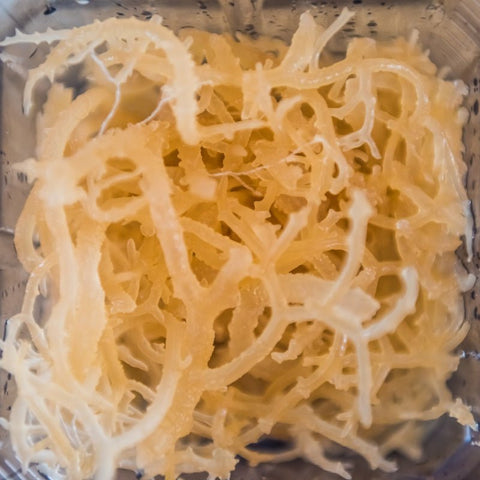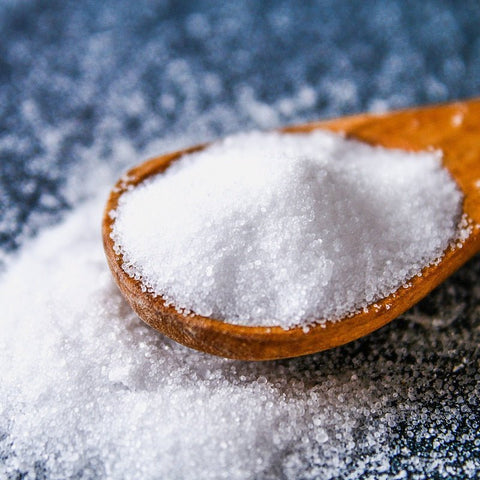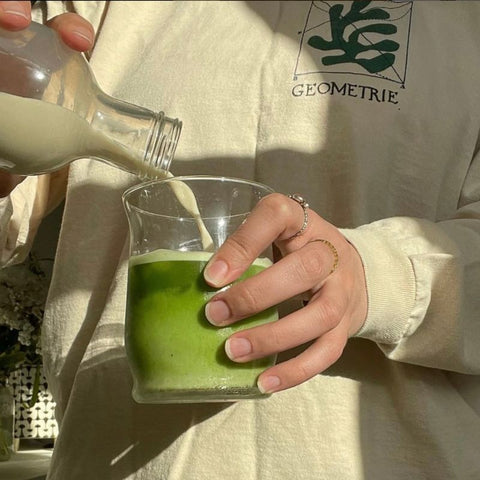You might have heard the term vegetarian collagen or vegan collagen which might be confusing because well, collagen cannot be vegan or vegetarian.This is true, but that doesn’t mean that if you’re vegan or vegetarian, you are without a way to supplement your collagen. You actually can increase your body’s natural collagen using completely plant-based sources like our superfood creamers!
You might be looking for a collagen support to help aid your natural production in the body because you want to help support your hair, skin, and nails or because you want to just support this important building block in the body. Either way, we have you covered. Here is a complete guide to vegetarian collagen and how you can find a collagen supplement that is both beneficial but also adheres to your diet and lifestyle.
So... What Even is Collagen?
In order to understand what you are supplementing, let’s take a look at what collagen is in the body.
Collagen is the most abundant protein found in the body. This structural protein (which is made up of amino acids) is found in the bones, muscles, tendons, and skin, and is essentially the glue that holds the body together and keeps it functioning. Throughout the body, collagen works as a building block. It also supports the skin by strengthening, hydrating, and maintaining elasticity – basically, it keeps your complexion looking glowy and youthful!*
Here’s a quick science lesson: collagen synthesis occurs naturally in the body. In order to make collagen, the body needs amino acids, as well as vitamin C, zinc, and copper. The collagen synthesis process primarily occurs within and outside of fibroblasts, a network of collagen-producing cells. Fibroblasts are found in the skin, tendons, and other connective tissues in the body. Collagen is found throughout the body, and works as a building block for the skin, hair, bones, muscles, ligaments, and tendons. There are 28 known types of collagen in the body, but around 80% to 90% of the collagen found in the body is type I, II, or III.
As far as the skin goes, collagen strengthens, hydrates, and helps maintain elasticity, keeping the complexion looking youthful and glowing. Collagen works in the dermis (the middle layer of skin), helping to form fibroblasts for new cells to grow. Collagen supports stronger hair and nails.

Why Do We Need to Supplement Collagen?
As we age, the natural synthesis of collagen in our body gradually decreases, and existing collagen in the body breaks down. This process is normal and varies from person to person. It is believed that around the ages of 20-25, the body produces about 1% less collagen in the skin every year. For women, after menopause, that decline becomes even more drastic due to hormonal changes.
There are also environmental factors that can affect the natural production of collagen. This can include exposure to the sun and damaging UV rays, lack of sleep, high levels of stress, smoking, drinking excess alcohol, a high-sugar diet, and not getting enough exercise.
With this gradual decline in collagen can come a variety of side effects. This can include wrinkles and less elastic skin, joint pain, weakening muscles, and stiffer tendons and ligaments.
Does Vegetarian Collagen actually work?
We actually went to bat to make sure our vegetarian collagen supports worked and you can find and see our results from our consumer survey!
Some of our findings included:
- 100% of respondents noticed increased skin hydration in 2 months
- 100% of respondents noticed a difference in overall skin glow in 2 months
- 92.9% of respondents noticed a difference in hair thickness in 2 months
- 92.9% of respondents noticed a difference in nail strength in 2 months
- 100% of respondents noticed a difference in overall skin vibrance and "glow"
Each participant took 2 doses of our Plant-Based Collagen Boost Blends in their diets each day for 8 weeks and reported on the results. Participants completed surveys at the 2, 4, 6, and 8-week marks, reporting if they saw any changes in their hair, skin, and nail health, as well as reporting any changes in how they feel or anything else they noticed as a result of adding the collagen support blends to their routine.

What is the difference between Vegetarian Collagen and Animal Collagen Supplements?
While they are meant to serve the same purpose, there are some pretty notable differences between vegan collagen supports and animal-based collagen. First and foremost are the ingredients! Here’s what you need to know about these two options.
Animal-Based Collagen
Animal-based collagen supplements use real collagen derived from the hooves, bones, connective tissues, and even skins of animals. As you look at the various options on the market, you may also come across marine collagen, which contains collagen derived from the scales of fish which is a pescatarian collagen option. All of these animal-derived collagen products are formulated with the idea that you can give your body an outside source of collagen in order to make up for the loss of collagen in your body.
Naturally, one point of concern with these types of collagen products is the environmental impact of using more animal-based products, as well as the ethical dilemma. Some people have also noted that they experience side effects when taking animal-based collagen. Gastrointestinal side effects are particularly common, and some may deal with stomach aches when taking animal-based collagen.
A less serious factor to consider is the taste. Many collagen powders are unflavored or marketed as being “tasteless,” but they aren’t always intended to be added in to improve the taste of your coffee or smoothie. Finding animal-based collagen with a taste you crave can be a challenge, and naturally, you’d want an option that you’re actually willing to take on a regular basis in our coffee, matcha, or smoothies.
It’s important to note that you can support your body’s collagen levels without using animal-derived products. There is some debate about whether or not animal-based collagen products actually address the underlying issue behind why your body isn’t producing enough of its own collagen. By taking a finished collagen peptide, you may be putting a bandaid on the issue, rather than getting to the root problem.
Here’s something else to consider: animal-based collagen doesn’t just start working as collagen in your body as soon as you consume it. When digested, the collagen is broken down into amino acids, and then absorbed and used to produce either collagen or other proteins, depending on what your body needs at the moment. This means that taking actual animal-derived collagen isn’t your only option if you’re looking to increase your collagen levels. You can alternatively focus on consuming foods and supplements that are rich in amino acids (and other vitamins and minerals necessary to support collagen production – more on that below!). This will more directly get to the root issue behind why your body isn’t producing as much collagen on its own and give it the support it needs for optimal collagen production.*

Vegetarian Collagen Supports
On the other end of the spectrum are vegetarian collagen support supplements, which work a bit differently than their animal-based counterparts. As you may have guessed, you can’t actually source collagen from plants — it is only found in animals and humans. Rather than giving the body an outside source of collagen, these types of products contain targeted ingredients that support the body’s natural collagen production process.* We will get more into what type of ingredients help aid this process.
In order to create collagen, the body needs amino acids, vitamin C, zinc, and copper. Vegan collagen-supporting supplements contain specific plant-based ingredients rich in these elements so that the body has the building blocks it needs in order to naturally produce its own collagen.* Unlike animal-based collagen, these plant-based products get to the root issue behind why your body isn’t producing enough of its own collagen and give it the support it needs to boost its collagen production naturally.*
Let’s look at Copina Co. Plant-Based Collagen Boost Drink Blends as an example. These herbalist-approved formulas are packed with vitamins, minerals, and amino acids to boost the body’s ability to naturally make its own collagen. All drink blend flavors contain bamboo leaf extract, organic tremella mushroom extract, organic amla berry, biotin, and gotu kola, as well as additional ingredients that promote collagen production and support the skin, hair, and nails.* Not every vegan or vegetarian collagen supplement is made similarly, so make sure to check what ingredients in your powders or supplements will be helping boost your body’s collagen!
Copina Co's Plant-Based Collagen-Supporting Blends help address both collagen degradation and support your body's natural collagen production. They're available in 4 varieties: Matcha and Cacao Calm which can be used in lattes or smoothies and Vanilla and Original which make amazing creamers or blends in smoothies.
Copina Co.’s Vegetarian Collagen Boosting Ingredients
-
Amla Berry
Amla Berry benefits your skin by promoting collagen production, which helps your skin stay smooth and supple as you age. Lastly, it helps even your skin tone and uses vitamin C to treat any skin pigmentation. Vitamin C will brighten your complexion, fade hyperpigmentation, and protect your skin against the damaging effects of pollution.*
-
Tremella Mushroom Extract
The tremella mushroom, or tremella fuciformis or “snow mushroom”, is an edible species of fungus that has been used in Eastern medicine for over a thousand years. This superfood has historically been used to help boost skin hydration over time after being consumed.* The mushroom’s ability to hold water, as well as its nutrient properties, make it a skincare powerhouse. These ingredients within this superfood mushroom all help boost collagen production and polysaccharides specifically are a carbohydrate chain that helps promote collagen synthesis in the skin. This all leads to improved skin elasticity and reduction of fine lines and wrinkles.*

-
Bamboo Leaf Extract
Bamboo leaf extract is one of our favorite ways to boost our hair, skin, and nail health.* Bamboo extract is a rich source of silica, a naturally occurring mineral found in plants, which supports the body's collagen production as well as healthy hair, skin, and nails. Silica-rich bamboo has been used in Indian Ayurvedic medicine and Chinese herbal medicine for centuries to promote healthy skin, easier breathing, strong bones and more.*
-
Biotin
Biotin is a member of the vitamin B complex family. You probably have seen biotin in the daily supplements you may take or on shampoo labels. Its primary functions include turning the nutrients we ingest (i.e. proteins, fats, and carbohydrates) into energy that our body can use. Each Copina Co. blend contains 3,000mcg Biotin per serving. That amounts to over 10,000% of your daily value.* Biotin is also critical for the daily use of fats, carbohydrates, amino acids (like in collagen), and energy (ATP).*
-
Gotu Kola Whole Plant Extract
Gotu Kola is an Ayurvedic herb noted for skin health, which contains collagen-synthesis enhancing triterpenes such as asiaticoside.* Gotu Kola has been shown to enhance the cross-linking of collagen and support increased collagen production in the body.* Several studies have shown that skin thickness, elasticity, and collagen levels all increased with the addition of Gotu Kola to a patient’s regimen.*
-
Hyaluronic Acid
Our cells produce hyaluronic acid to balance moisture levels in our bodies, but make less of it as we age.* Our food-grade hyaluronic acid helps to boost collagen production in our bodies and helps our skin attract and retain moisture, helping with aging* and can be found in all of our beauty blends. It’s also been shown to help smooth wrinkles, boost elasticity, help with skin firmness and boost skin radiance.* Another amazing thing about hyaluronic acid is that it has been shown to help lubricate joints and promote joint health.*
If you would like even more details about our collagen-boosting and vegan ingredients, check out our blog where we have a plant education section specifically talking about all our ingredients! This includes our other ingredients like Matcha, Cacao, and Ashwagandha!

Which Should I Use?
What you put in your body is always a personal choice, which is why we love sharing the educational background of why we chose each ingredient that goes into our vegetarian and vegan collagen supplements. While both vegan and animal-based collagen products can have an impact on your collagen levels, the pros of vegan collagen support products far outweigh the pros of animal-based collagen.
When formulated with high-quality ingredients, vegan collagen support products can effectively counteract some of the negative effects of collagen loss for strong and healthy skin, nails, and hair. Most importantly, they are safe to use, and also don’t come with the environmental and ethical dilemmas that are tied to animal-based collagen products.
We also share collagen-boosting recipes on our Instagram and Tik Tok every week. We full-heartedly believe in supporting the body from the inside out and love sharing other wellness and health content there as well that can help support you to live your best life (and achieve that #CopinaCoGlow)!
Some other blog posts you might enjoy:
- Vegan Collagen Support Vs. Animal-Based Collagen: Which Is Right For You?
- How to make a Vegan Collagen Creamer
- The Results From Copina Co’s Vegan Collagen Support Consumer Survey
- What Is Vegan Collagen? Everything You Need To Know
- An Ultimate Guide To All Copina Co’s Vegan Collagen-Supporting Ingredients










